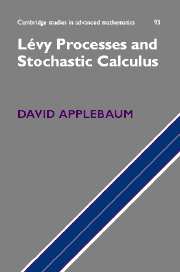Book contents
- Frontmatter
- Contents
- Preface
- Overview
- Notation
- 1 Lévy processes
- 2 Martingales, stopping times and random measures
- 3 Markov processes, semigroups and generators
- 4 Stochastic integration
- 5 Exponential martingales, change of measure and financial applications
- 6 Stochastic differential equations
- References
- Index of notation
- Subject index
3 - Markov processes, semigroups and generators
Published online by Cambridge University Press: 06 July 2010
- Frontmatter
- Contents
- Preface
- Overview
- Notation
- 1 Lévy processes
- 2 Martingales, stopping times and random measures
- 3 Markov processes, semigroups and generators
- 4 Stochastic integration
- 5 Exponential martingales, change of measure and financial applications
- 6 Stochastic differential equations
- References
- Index of notation
- Subject index
Summary
Summary Markov processes and the important subclass of Feller processes are introduced and shown to be determined by the associated semigroups. We take an analytic diversion into semigroup theory and investigate the important concepts of generator and resolvent. Returning to Lévy processes, we obtain two key representations for the generator: first, as a pseudo-differential operator; second, in ‘Lévy–Khintchine form’, which is the sum of a second-order elliptic differential operator and a (compensated) integral of difference operators. We also study the subordination of such semigroups and their action in Lp-spaces.
The structure of Lévy generators, but with variable coefficients, extends to a general class of Feller processes, via Courrège's theorems, and also to Hunt processes associated with symmetric Dirichlet forms, where the Lévy–Khintchine-type structure is apparent within the Beurling–Deny formula.
Markov processes, evolutions and semigroups
Markov processes and transition functions
Intuitively, a stochastic process is Markovian (or, a Markov process) if using the whole past history of the process to predict its future behaviour is no more effective than a prediction based only on a knowledge of the present. This translates into precise mathematics as follows.
Let (Ω, F, P) be a probability space equipped with a filtration (Ft, t ≥ 0). Let X = (X(t), t ≥ 0) be an adapted process.
- Type
- Chapter
- Information
- Lévy Processes and Stochastic Calculus , pp. 120 - 189Publisher: Cambridge University PressPrint publication year: 2004



